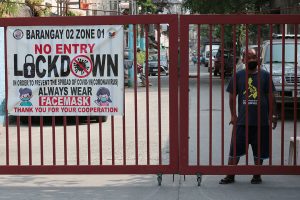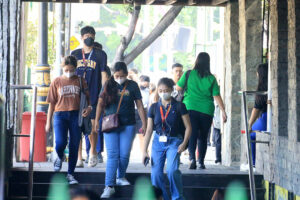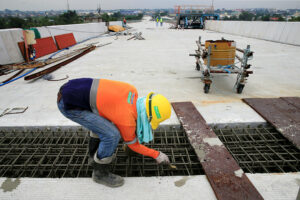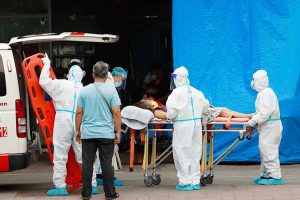No-lockdown policy outlined in SONA to aid frontline businesses

THE no-lockdown policy declared by President Ferdinand R. Marcos, Jr. during his State of the Nation Address (SONA) will help the restaurant industry and other frontline businesses, which oppose measures that cut down on foot traffic and mobility, the Department of Trade and Industry (DTI) said on Tuesday.
Trade Secretary Alfredo E. Pascual told reporters on the sidelines during the post-SONA economic briefing in Pasay City that restaurants will be more confident in doing business if a no-lockdown policy is observed.
“The businesses are always for no lockdown. Clearly, the reason why many frontline establishments collapsed is because there are no customers going to them… With no lockdown, the restaurants will be accessible to consumers,” Mr. Pascual said.
Mr. Marcos said in his SONA on July 25 that he will seek to balance the needs of public health and the economy over the remainder of the pandemic.
“Sa ating sitwasyon ng pangkalusugan, nariyan pa rin ang banta ng COVID-19, lalo’t may mga nadidiskubreng bagong variants ng coronavirus. Pero hindi na natin kakayanin ang isa pang lockdown. Wala na tayong gagawing lockdown (Regarding public health, the dangers of COVID-19 remain, particularly with the emergence of new variants. But we will not be able to afford another lockdown. Lockdowns will not be resorted to),” Mr. Marcos said.
Mr. Marcos said the government is talking to drug manufacturers to bring down the cost of medicine, particularly for generic drugs.
“Sinimulan ko na ang pakikipag-usap sa mga kumpanya ng gamot dito sa Pilipinas at sa ibang bansa. Hinihikayat natin na buksan nila ang merkado upang bumaba ang presyo ng gamot. Halimbawa, kung mas marami ang mas murang generic o hindi branded na gamot sa merkado, mas bababa rin ang presyo dahil sa kumpetisyon (We have begun talks with drugmakers. We are seeking to open our markets in a way that brings drug prices down. The government believes that more generic drugs will help make drugs cheaper because of competition),” Mr. Marcos said.
“Ang DTI ay nakikipag-usap sa mga interesadong manufacturer ng generic drugs na papasok sa ating bansa (The DTI is negotiating with generics companies that are interested in manufacturing here),” he added.
Mr. Pascual confirmed that he has met with the Pharmaceutical and Healthcare Association of the Philippines (PHAP) and plans more meetings with the goal of expanding domestic production.
“I’ve met with the PHAP and we had a good exchange. I’m also going to meet another pharmaceutical company association consisting of domestic companies,” Mr. Pascual said.
“The thing here is how you convince consumers… that generics, especially from reliable producers or manufacturers, are as good as the branded alternative. It is in the advertising or promotion of their products,” Mr. Pascual said.
Separately, Mr. Marcos also said during the SONA that he directed the Philippine Competition Commission (PCC) to ensure an equal playing field among pharmaceutical companies.
“Inuutusan ko naman ang PCC na pantay-pantay dapat at walang kartel sa hanay ng mga pharmaceutical companies. Dahil kapag bukas ang merkado, bababa ang presyo ng gamot para mapakinabangan ng ating mga mamamayan (I have ordered the PCC to ensure fair competition and deter cartel behavior among pharmaceutical companies. An open market will bring down drug prices to the benefit of consumers). This is one of the hard lessons that we learned when the pandemic struck, and therefore, we must act on that shortcoming,” Mr. Marcos said.
PCC Officer-in-Charge Chairperson Johannes R. Bernabe said in a statement on Tuesday that the commission has been monitoring potential anti-competitive practices, including cartel behavior, which may be taking place within the supply chain of pharmaceutical products.
“The PCC will pursue with even more resolve inquiry into the pharmaceutical sector, on top of its current efforts in this priority sector,” Mr. Bernabe said.
Tourism Secretary Ma. Esperanza Christina G. Frasco said in her post-SONA economic briefing that she is planning to offer incentives to encourage sustainable practices within the industry.
“It’s very important to incentivize sustainable tourism,” she said, adding that her department is planning to introduce “incentives for the private sector (for implementing) green policies… as well as… measures that promote environmental protection, energy-efficient usage, and the like,” Ms. Frasco said.
“On the part of the local government units… it’s very, very important to institutionalize zoning and land use regulations, in that we strictly implement the regulation of the development and the use of tourism destinations, to ensure that [its] use as a tourism destination lasts for the long term…,” Ms. Frasco said. — Revin Mikhael D. Ochave




